
Abbas Akhavan, Study for a Monument, 2013–2015. Photo: LNDW Studio.
Assemblages of Intimacy
April 22 – June 24, 2018
ABBAS AKHAVAN
EAMONN HARNETT
MIKHAIL KARIKIS
ERIC PETER
curated by Eamonn Harnett
How can we become more involved with our natural and socio-political environment? And in what way does a place affect foundations of identity? These questions are central to the exhibition Assemblages of Intimacy. These artists focus our attention on a number of unique and remarkable geological places on earth: the area between the Euphrates and the Tigris; an uninhabited workers’ village in Tuscany; the coast of Ireland; and protected areas in the Philippines. Through performance, sculpture, video and poetry, the artists problematise the shifting relationship between culture and nature, questioning our ideas about communality and progress.
For Reflections upon an unknown country (2018) EAMONN HARNETT travelled to the South West Coast of Ireland to explore the utopian ideals of his parents, who ran a llama farm there during his teenage years. Harnett juxtaposes the material that resulted from this travel with his recent film Hopes for unity, self articulation and sustainability of a group (2018), which derives from his previous experience of staying with the Agta, an indigenous people who live in isolated mountainous parts of the island of Luzon, the Philippines, along with saltwater aquariums inhabited by North Sea anemones. Through a layering of personal and non-personal references of traditional world views and existing biotope systems, Harnett questions what— physically and emotionally—forces us to become more involved, empathetic and at one with the natural environment.
In his work, ABBAS AKHAVEN investigates the capacities of objects and systems to express stark contradictions such as hostility and hospitality, familiarity, and strangeness. His studies or ‘variations’ have been deeply influenced by the specificity of the sites where he works: the architectures that house them, the economies that surround them, and the people that frequent them. Study for a Monument (2013–15) presents a series of bronze plants laid out on white cotton bed sheets. The work is an attempt to archive plants belonging to regions around the Tigris and Euphrates rivers—present day Iraq—that have been destroyed by Saddam Hussein’s government. Using information from botanical archives, the artist created the plants by hand in plasticine and wax before casting them in bronze. They are presented as a funerary monument or forensic evidence on the monumental floor of the bath house.
In his film Children of Unquiet (2014), MIKHAIL KARIKISM orchestrates a children’s ‘take over’ of an uninhabited workers’ village in Italy, centring on the children’s aural and physical interventions. The work features forty-five children who are growing up around a deserted industrial village, abandoned by their parents after the complete automation of the local geothermal power plant where they all worked. The site is in the Devil’s Valley in Tuscany, known for inspiring the hellish descriptions of Dante’s Inferno and for being the place where the first sustainable energy power plant in the world was built. In Karikis’ video, youngsters between five and twelve years old seize the depopulated sites, transforming the vaporous wasteland into a self-organized school and a playground.
ERIC PETER’s practice encompasses installations, discussions, gatherings, workshops, performances, drawings, text, or video works—in which there is an emphasis on exchange, sharing and mediating different thoughts or opinions. The context of other voices, beliefs, processes, or narratives within his very personal works allow for alternatives to our (collective) reality. With his ongoing project Economy as Intimacy, the artist questions the relationship between economy and intimacy. The writing and recitation of poems by the artist about economic exchanges—between sellers, buyers, and producers—enables a certain personalization of the economic, at a time when income, wages and debt have become increasingly elusive. The artist does not see his work as a romanticisation, but rather as a speculative recalibration of cultural and social norms.
Support
Assemblages of Intimacy is supported by the Municipality of Rotterdam. Eamonn Harnett’s travel in the Philippines was made possible by a Young Talent Grant from the Mondriaan Fonds. Special thanks to the Family Servais Collection for the loan of Study for a Monument (2013–15).
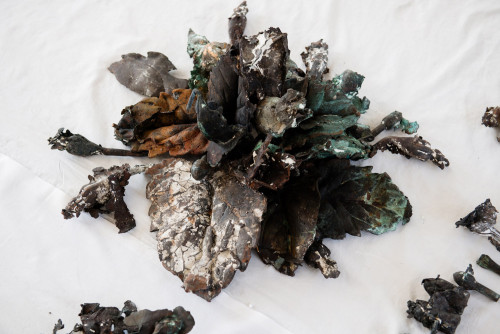
Abbas Akhavan, Study for a Monument, 2013–2015. Photo: LNDW Studio.
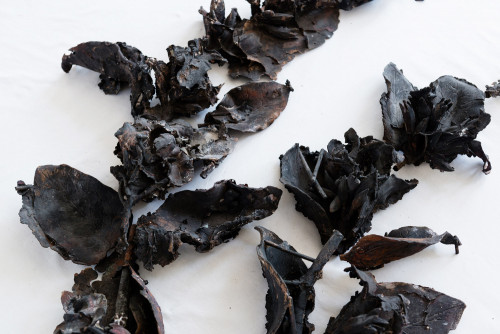
Abbas Akhavan, Study for a Monument, 2013–2015. Photo: LNDW Studio.
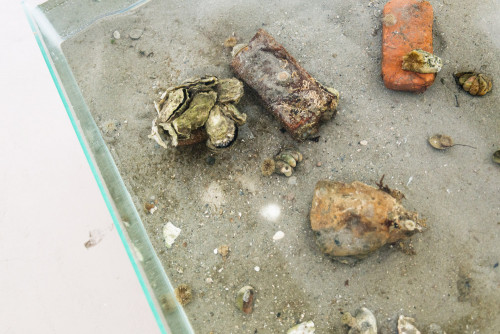
Exhibition view, Assemblages of Intimacy, 2018. Photo: LNDW Studio.
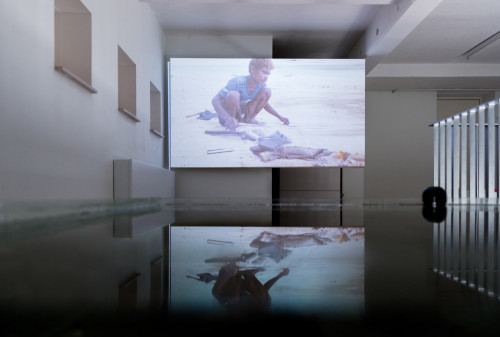
Eamonn Harnett, Hopes for unity, self articulation and sustainability of a group, 2018. Photo: LNDW Studio.
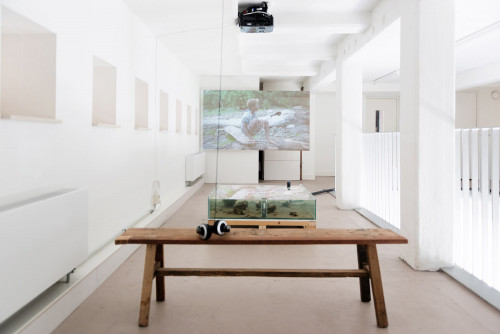
Installation view, Assemblages of Intimacy, 2018. Photo: LNDW Studio.

Installation view, Assemblages of Intimacy, 2018. Photo: LNDW Studio.
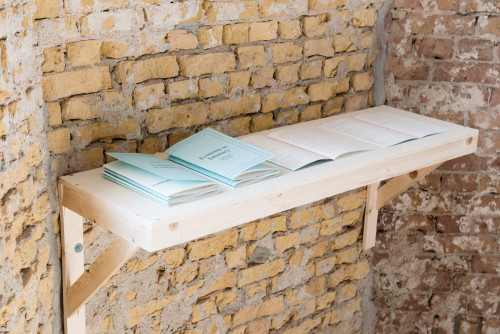
Eric Peter, Economy as Intimacy, 2018. Photo: LNDW Studio.
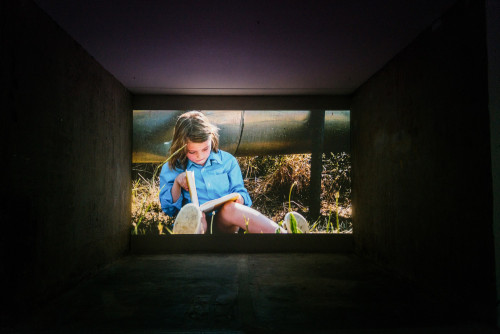
Mikhail Karikis, Children of Unquiet, 2014. Photo: LNDW Studio.

Eric Peter, Economy as Intimacy, 2018. Photo: LNDW Studio.
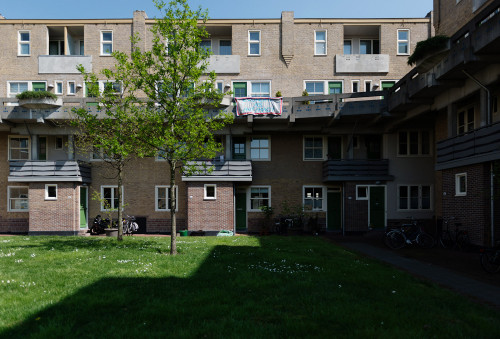
Eric Peter, Economy as Intimacy, 2018. Photo: LNDW Studio.
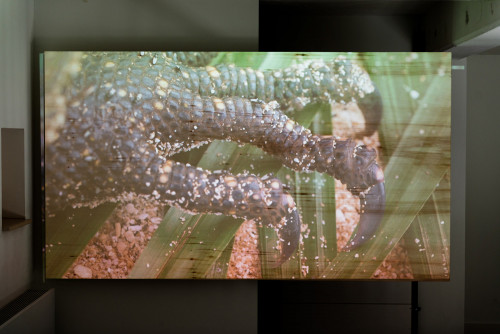
Eamonn Harnett, Reflections upon an unknown country, 2018. Photo: LNDW Studio.
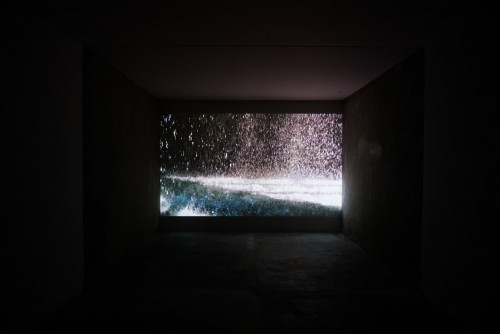
Mikhail Karikis, Children of Unquiet, 2014. Photo: LNDW Studio.